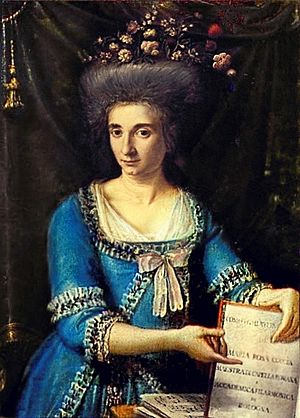Maria Rosa Coccia facts for kids
Quick facts for kids
Maria Rosa Coccia
|
|
|---|---|

Maria Rosa Coccia, maestra di capella romana
|
|
| Born | 4 January 1759 Rome, Italy
|
| Died | November 1833 Rome, Italy
|
| Nationality | Italian |
| Occupation | Harpsichordist, composer |
Maria Rosa Coccia (born January 4, 1759 – died November 1833) was a talented Italian musician. She played the harpsichord and wrote music (a composer).
Contents
Life of a Young Musician
Maria Rosa Coccia was born in Rome, Italy. She learned music from Sante Pesci, a well-known teacher.
When she was just 13 years old, Maria Rosa showed how amazing she was. She wrote six pieces for the harpsichord, which is an old keyboard instrument. She also wrote a big musical story called Daniello, which was performed that same year. This was very special because, usually, women were not allowed to be part of these public music performances.
Becoming a Music Master
A long time before Maria Rosa, in 1716, a rule was made by Pope Clement XI. It said that anyone who wanted to work as a musician in Rome had to join the Accademia di Santa Cecilia (a famous music academy) and pass a tough exam. If they passed, they could become a 'Maestro di Capella'. This title meant they were a very important music director, often for churches.
When Maria Rosa was 16, she passed this difficult exam! She earned the title of Maestro di Capella. However, because she was a woman, she was never allowed to actually do the job. Even though she couldn't lead the music, her own compositions were still performed. She was also accepted into another important group for composers in Rome, called the Accademia de' Forti.
Standing Up for Her Music
In 1780, a music director named Francesco Capalti from Narni Cathedral criticized Maria Rosa's exam music and her title. He thought she shouldn't have received it.
But Maria Rosa had many supporters! A man named Michele Mallio wrote a book defending her. This book included letters from famous musicians and writers like Metastasio, Carlo Broschi, and Giovanni Battista Martini. Later, in 1784, Pasquale Antonio Basili also wrote a public letter defending Maria Rosa and disagreeing with Capalti's criticism.
Maria Rosa Coccia continued to live in Rome until she passed away in November 1833.
Maria Rosa's Music
Maria Rosa Coccia wrote many different kinds of musical pieces. Here are some of her known works:
- Six Sonatas for harpsichord (pieces for the harpsichord)
- Daniello nel lago dei leoni (Daniel in the Lions' Den), an oratorio (a big musical story, like an opera but without costumes or acting), performed in Rome in 1772.
- L'isola disabitata (The Uninhabited Island), a musical work from 1772.
- Hic vir despiciens mundum, a fugue (a type of musical composition) for four voices, written in 1774. This was part of her exam.
- Magnificat, a piece for soprano and contralto voices with organ, from 1774.
- Dixit Dominus, a piece for eight voices and organ, from 1775.
- Il trionfo d'Enea (The Triumph of Aeneas), a cantata (a vocal piece with instruments) in two parts, likely from 1779.
- Arsinoe, a cantata for four voices and orchestra, from 1783.
- Confitebor, for two soprano voices and organ.
- Salve Regina, for two voices and organ.
- Veni Creator Spiritus, for four voices and organ.
 | William L. Dawson |
 | W. E. B. Du Bois |
 | Harry Belafonte |

